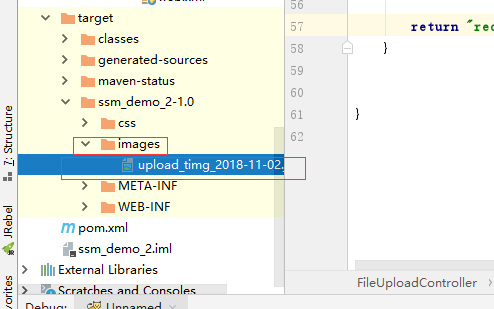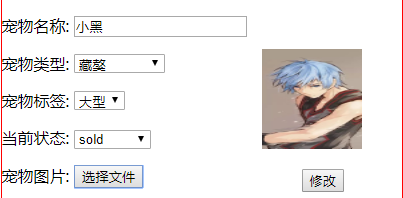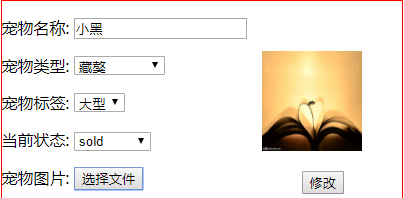1、Form Upload
SpringMVC 中,文件的上传是通过 MultipartResolver 实现的,所以要实现上传,只要注册相应的 MultipartResolver 即可。
MultipartResolver 的实现类有两个:
CommonsMultipartResolver(需要 Apache 的 commons-fileupload 支持,它能在比较旧的 servlet 版本中使用,兼容性好)StandardServletMultipartResolver(不需要第三方 jar 包支持,它使用 servlet 内置的上传功能,但是只能在 Servlet 3 以上的版本使用
以 StandardServletMultipartResolver 为例,使用步骤如下。
首先,在 web.xml 中为 DispatcherServlet 配置 Multipart:
<servlet> <servlet-name>mvc</servlet-name> <servlet-class>org.springframework.web.servlet.DispatcherServlet</servlet-class> <multipart-config> <max-file-size>5242880</max-file-size> <!-- 上传文件的大小限制,比如下面表示 5 M --> <max-request-size>10485760</max-request-size> <!-- 一次表单提交中文件的大小限制,必须下面代表 10 M --> <file-size-threshold>0</file-size-threshold> <!-- 多大的文件会被自动保存到硬盘上。0 代表所有 --> </multipart-config> </servlet>
其次,在spring中注册MultipartResolver:
<bean id="multipartResolver" class="org.springframework.web.multipart.support.StandardServletMultipartResolver"></bean>
然后就可以使用了。
前端代码:
<%@ page contentType="text/html;charset=UTF-8" language="java" %> <html> <head> <title>文件上传</title> </head> <body> <form action="/upload" method="post" enctype="multipart/form-data"> <input type="file" name="filename"> <input type="submit" value="提交"> </form> </body> </html>
后端代码:
package com.oukele.web; import org.springframework.stereotype.Controller; import org.springframework.web.bind.annotation.PostMapping; import org.springframework.web.bind.annotation.RequestMapping; import org.springframework.web.bind.annotation.RequestMethod; import org.springframework.web.bind.annotation.RequestPart; import org.springframework.web.multipart.MultipartFile; import javax.servlet.http.HttpServletRequest; import java.io.File; import java.io.IOException; import java.text.SimpleDateFormat; import java.util.Date; import java.util.regex.Pattern; @Controller @RequestMapping(path = "/upload") public class FileUploadController { @RequestMapping(path = "",method = RequestMethod.GET) public String getPage(){ return "fileupload"; } @PostMapping public String fileUpload(@RequestPart("filename")MultipartFile multipartFile, HttpServletRequest request) { if( !multipartFile.isEmpty() ){ //验证文件是否为图片格式 && 文件大小不能超过 5M 1KB = 1024B if( multipartFile.getContentType().contains("image/") && multipartFile.getSize() < 1024 * 1024 * 1024 * 5 ){ //图片的存储文件夹 String save = request.getServletContext().getRealPath("/images"); File file = new File(save); if( !file.exists() ){ file.mkdirs(); } //文件名 String fileName =multipartFile.getOriginalFilename().substring(0,multipartFile.getOriginalFilename().indexOf(".")); //上传文件的后缀 String zhui = multipartFile.getOriginalFilename().substring(multipartFile.getOriginalFilename().indexOf("."),multipartFile.getOriginalFilename().length()); SimpleDateFormat simpleDateFormat = new SimpleDateFormat("yyyy-MM-dd"); //生成新的文件名 String fileNewName ="upload_"+fileName+"_"+simpleDateFormat.format(new Date())+zhui; try { //将此图片存储到images文件夹中 multipartFile.transferTo(new File(save+"\"+fileNewName)); } catch (IOException e) { e.printStackTrace(); } }else{ return ""; } } return "redirect:/upload"; } }
运行:

结果:

以ajax的方式,进行文件上传
前端代码:
<form action="#" method="post" enctype="multipart/form-data"> 宠物图片: <input type="file" name="filename" id="update_pet_img" style=" 70px"> </form>
<img style="margin-top: 50px" class="update_img" src="" width="100px" height="100px" alt="未上传图片">
js脚本
<script src="${pageContext.request.contextPath}/js/jquery-1.12.3.js"></script> <script> //修改区域-->,点击选择文件的时候实现自动上传图片。 $("#update_pet_img").change(function () { var form = $(this).closest("form"); update_file_img(form); }); //图片上传 function update_file_img(file) { var formData = new FormData($(file)[0]); //ajax请求 $.ajax({ type: "post", url: "/imgUpload", data: formData, contentType: false,//告诉客户端不要设置Content-Type 请求头部 processData: false,//告诉客户端不处理过程数据 success: function (data) {//完成后的事件 $(".update_img").attr("src", data.img_src);//data.img_src得到图片的地址 }, error: function (error) {//出现错误时的事件 alert("出错啦。"); } }); } </script>
后端代码:(这里只是简单示例,练习可以适当减少)
package com.oukele.web; import org.springframework.stereotype.Controller; import org.springframework.ui.Model; import org.springframework.web.bind.annotation.*; import org.springframework.web.multipart.MultipartFile; import javax.servlet.http.HttpServletRequest; import javax.servlet.http.HttpServletResponse; import javax.servlet.http.HttpSession; import java.io.File; import java.text.SimpleDateFormat; import java.util.Date; @Controller @RequestMapping(path = "/imgUpload") public class FileUpload { /* * 宠物图片上传 * */ @PostMapping(produces = "application/json;charset=utf-8") @ResponseBody public String imgUpload(@RequestPart("filename") MultipartFile multipartFile, HttpServletRequest request, HttpServletResponse response){ if (multipartFile.isEmpty()) { return "{"error":"文件为空,错误格式"}"; } if (!multipartFile.getContentType().contains("image/")) { return "{"error":"只允许上传图片的文件"}"; } if (multipartFile.getSize() > 1024 * 1024 * 1024 * 5) { return "{"error":"图片大小不能超过5M"}"; } //图片的存储文件夹 String save = request.getServletContext().getRealPath("/images"); File file = new File(save); if (!file.exists()) { file.mkdirs(); } String file1 = createFile(save, multipartFile); return file1; } //创建文件夹,格式为以日期文件名 比如 2018112 , 和 新的文件名,格式为 upload_文件名_日期.后缀名 public String createFile(String path, MultipartFile multipartFile) { boolean flag = false; String imgpath =""; //创建文件夹 SimpleDateFormat simpleDateFormat = new SimpleDateFormat("yyyyMMdd"); String dataFile = "/" + simpleDateFormat.format(new Date()); path += dataFile; File file = new File(path); if (!file.exists()) { file.mkdirs(); } //文件名 String fileName = multipartFile.getOriginalFilename().substring(0, multipartFile.getOriginalFilename().indexOf(".")); //上传文件的后缀 String zhui = multipartFile.getOriginalFilename().substring(multipartFile.getOriginalFilename().indexOf("."), multipartFile.getOriginalFilename().length()); //生成新的文件名 String fileNewName = "upload_" + fileName + "_" + simpleDateFormat.format(new Date()) + zhui; try { //将此图片存储到对应的文件夹中 multipartFile.transferTo(new File(path + "/" + fileNewName)); imgpath ="/images"+dataFile+"/"+ fileNewName; flag = true; } catch (Exception e) { flag = false; e.printStackTrace(); } if( flag ){ return "{"img_src":""+imgpath+""}"; } return "{"error":"出现异常"}"; } }
演示:
